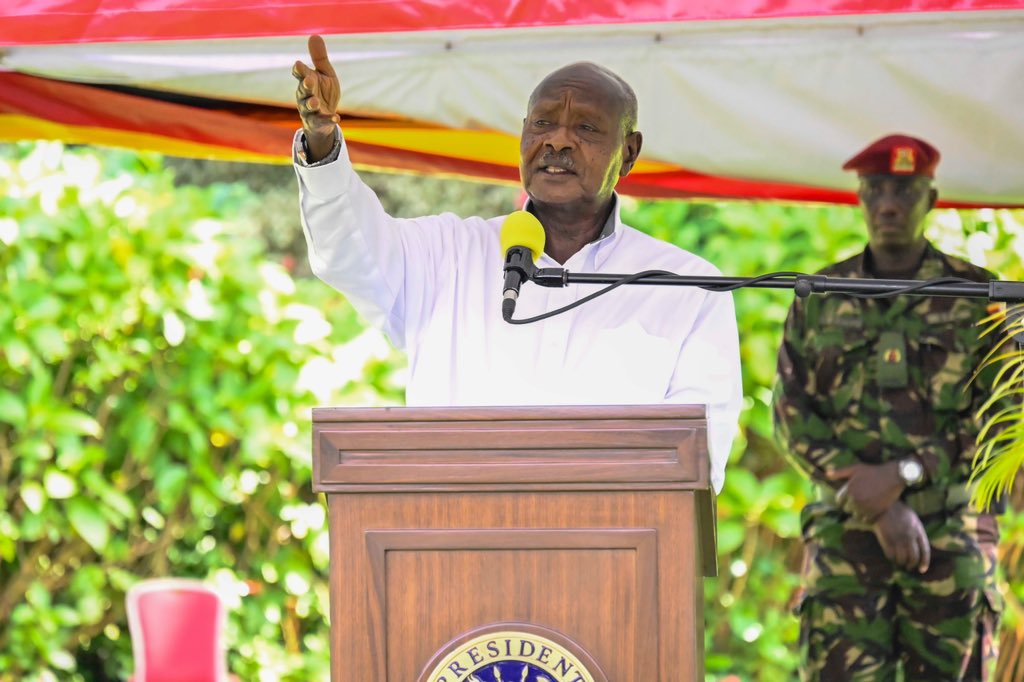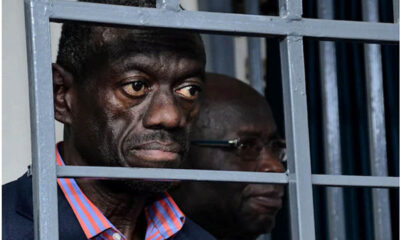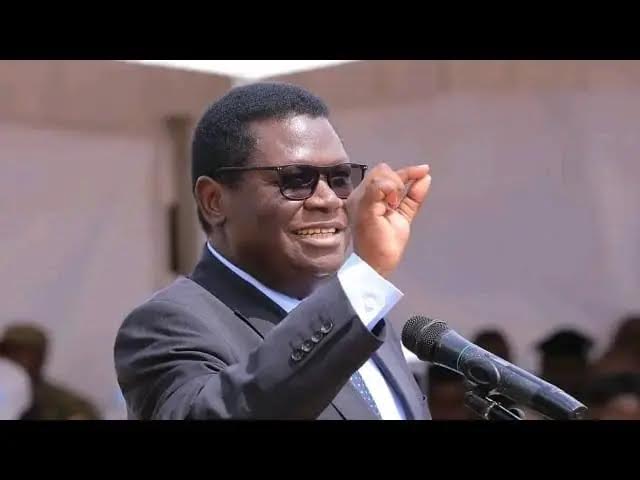
President Museveni’s 2024 Martyrs day speech to Christians at Namugongo
Fellow Countrymen, Countrywomen and especially the Bazzukulu, I join the Balamazi (Pilgrims), from the different parts of Uganda; and those who have traveled from outside the Country, to commemorate Martyrs Day in Namugongo. I thank you all for honoring the memory and legacy of the Uganda Martyrs, who were executed by Kabaka Mwanga, because they refused to denounce Christianity.This commemoration is important because the persecution and death of the Martyrs did not stop the spread of Christianity in Uganda and other parts of Africa. The blood of the Martyrs watered the seed of Christianity. It was, therefore, not shed in vain, because their death served as a catalyst for the growth of Christianity.The Early Church believers were subjected to persecution, imprisonment and execution, at the hands of the Jewish Religious Leaders and some rulers of the Roman Empire. One example, in the Scriptures, is the martyrdom of St. Stephen. His death is recorded in the Book of Acts, chapter 7, verse 59. It says:“And they stoned Stephen as he was calling on God and saying, “Lord Jesus, receive my spirit.”The other example is found in Acts, chapter 12, verses 1-2. It is written:“…Herod the King stretched out his hand to harass some from the church. Then he killed James, the brother of John with the sword.” The other Apostles, for example, St. Peter, St. Paul, St. Matthew, etc. were killed for preaching the Gospel of Jesus Christ. The disciples of the Apostles, such as St. Clement of Rome, St. Ignatius of Antioch, etc. suffered a similar fate. Therefore, the Uganda Martyrs are part of the Church’s long history of martyrdom.The story of the Uganda Martyrs is proof that it is impossible to suppress correct ideas, especially if they are anchored on godliness and humanity. Some people have tried to fight new and dynamic ideas. However, history has taught us that if an idea is correct and progressive, it will eventually triumph. The teachings of Christianity are beneficial for every individual and society. The Gospel helps to cultivate a fear of God and love for other people, regardless of tribe, region or religion.The fear of God teaches the believers to guard themselves from engaging in evil practices that are likely to break their communion with the Creator. It makes you accountable to a Heavenly Father, who watches everything that you do, even in darkness. Christians are aware that they will face judgment for their words and actions, here on earth. Therefore, many of the evils, like corruption, embezzlement, defilement, murder, etc., are on account of the lack of Godly guidance, in people’s hearts. The fear of God imparts honesty, integrity and self-control.The other revolutionary idea taught by Christianity is love for our neighbors. Good neighborliness, as demonstrated in Jesus’ parable of the Good Samaritan, transcends the narrow confines of tribe, religion, race, gender, class, etc. It is all embracing; it does not discriminate against anyone. It is on account of this universal appeal of Jesus’ teaching that Christianity has been able to grow and spread to every corner of the world.The NRM’s ideology is also anchored on a non-sectarian philosophy. Our socio-economic agenda for spurring Uganda to modernity and prosperity is built on the foundation of Patriotism, Pan-Africanism and Fraternity. Within Uganda, we promote patriotism to consolidate unity and peaceful co-existence, among our people. Outside Uganda, we advocate for East African and African cooperation and integration, as a strategy for guaranteeing greater prosperity and security, for our people. We advocate for unity and resist the fragmentation of our people.Therefore, it was wrong for Kabaka Mwanga to persecute and kill the Christian converts. He should have encouraged his subjects to embrace the good practices and teachings of the Christian faith. They impart holiness and good neighborliness. Nonetheless, the Christian faith was never extinguished by Mwanga’s executions. Christianity continues to grow, because it is divinely inspired. Mwanga was fighting God. He could not win.Remember Saul, the persecutor of the Church, while on his way to Damascus, he encountered the Lord and He asked him:“Saul, Saul, why are you persecuting Me? The Lord continued and said:“I am Jesus, whom you are persecuting. It is hard for you to kick against the goads.” (Acts 9: 4-5).After that encounter, Saul was converted and became a zealous defender of the Gospel. Like Saul, Kabaka Mwanga was blind and acted out of ignorance.Before his death, St. Stephen made the following prayer for his tormentors:“Lord, do not charge them with this sin.” (Acts 9:60)This is because he knew that they were blind and misguided. Therefore, I ask all Christians to forgive Kabaka Mwanga.Finally, I would like to use this occasion to remind Christians to work hard to achieve decent and prosperous lives here on earth. I urge the religious leaders to emphasize the fact that man has both spiritual and physical needs. The spiritual needs are satisfied through praying to God, studying the scriptures, listening to religious and moral instruction, fasting, praise and worship etc. These enable a believer to draw closer to God and impart good morals and discipline in relating with other people.However, there are also physical needs that must be satisfied in order to achieve a happy, fulfilling and productive life. They include: food, water, shelter, medicine, hospitals, schools, clothes, transport, a job etc. In a modern economy, you cannot obtain the goods and services which are necessary to sustain life without money. Therefore, the first step that must be taken by an individual or household is to eliminate moneylessness or subsistence living, which satisfies only one need i.e. food.Moneylessness can be eliminated by undertaking a profitable enterprise in one of the four sectors of: commercial agriculture, industries, services and ICT. These are the four sectors where you can create jobs and wealth.Therefore, a relevant Christian Ministry is one that encourages the believers to work towards achieving decent standards of living. In the process of working for heaven, some of the faithful become negligent about their earthly responsibilities and thereby end up perpetuating and entrenching socio-economic backwardness and poverty in their respective families and societies.Jesus Christ should serve as an example to all the religious leaders and their followers. The Biblical record shows that besides fasting and prayer, He also healed the physical ailments of the blind, lame, lepers, deaf etc. He fed the hungry.Additionally, he earned his bread by working alongside his father Joseph as a carpenter. He worked for both the spiritual and socio-economic uplift of his family and society. This is what all Christians must emulate.I, once again, thank you all for remembering the Uganda Martyrs and wish you peaceful celebrations.I thank you all. https://www.ugbulletin.co.ug/president-musevenis-2024-martyrs-day-speech-to-christians-at-namugongo/
News
Ugandan Citizen Abducted, Held in Secret Detention for Three Months, Sparks Outrage and Calls for Justice

A disturbing new case of unlawful detention has surfaced, highlighting the ongoing human rights crisis in Uganda. A Ugandan citizen was reportedly abducted and held in a secret facility, known as a “safe house,” for three months, only to be released without charge or explanation. This incident, reported by NTV Uganda, has sparked widespread condemnation and renewed calls for accountability regarding human rights abuses in the country.
While the details surrounding the abduction remain unclear, reports indicate that the individual was taken without due process and held incommunicado—an action that has long been condemned by human rights organizations. The victim’s release, with no charges filed and no clear justification, has angered activists and citizens, who view this as yet another case of egregious abuse of power by the state.
“This is a recurring pattern,” said one human rights activist. “Abductions, secret detentions, and unexplained releases have become all too common in Uganda. These acts violate fundamental human rights and erode public trust in the justice system.”
The use of “safe houses,” unregistered detention facilities reportedly operated by security forces, has been a focal point in numerous allegations of torture and illegal imprisonment. Despite repeated calls from both local and international organizations for their closure and accountability for those involved, little action has been taken to address these violations.
This case underscores the urgent need for reform within Uganda’s security apparatus and greater accountability for human rights abuses. Observers hope that drawing attention to these injustices will spur concrete action to bring those responsible to justice and ensure the protection of basic human rights.
As frustration mounts, calls for both domestic and international pressure to hold the government accountable for such crimes grow louder. “One day, there must be accountability for all these crimes against our people,” stated one social media user, reflecting the sentiments of many Ugandans.
News
NUP Gathering Disrupted: Kyagulanyi Alleges Security Force Harassment and Arrests

National Unity Platform (NUP) President Robert Kyagulanyi has accused Ugandan security forces of using excessive force to disrupt a planned NUP gathering. The allegations were detailed in a statement shared on Twitter, following an event held to honor children of NUP supporters who were killed, disappeared, or detained for their political beliefs.
According to Kyagulanyi, security personnel, under the command of an officer identified as Asiimwe, carried out a preemptive operation early in the morning upon learning of the NUP’s plans. The forces allegedly stormed the premises, arrested workers, and deployed tear gas to disperse those present.
“The criminals under the command of one Asiimwe deployed early morning, arrested our workers, and threw tear gas into our premises. They’ve cordoned off the premises and blocked all people from accessing the place,” Kyagulanyi wrote.
Among those reportedly arrested were Saava Peter, Mudenya Samson, and Turyasingura Samson. Kyagulanyi claimed the detained workers were subjected to beatings and interrogated about their political affiliations, with security operatives labeling them as terrorists.
“These JATT operatives asked the workers who they support politically, branding them terrorists and criminals—their only crime being that they work with us. You can imagine the indignity!” Kyagulanyi lamented.
This incident adds to the growing tension in Uganda’s political climate, where opposition parties frequently accuse the government of stifling dissent. Despite the challenges, Kyagulanyi ended his statement with a message of defiance and optimism, proclaiming, “UGANDA WILL BE FREE.”
NUP Gathering Disrupted: Kyagulanyi Alleges Security Force Harassment and Arrests
News
Sudan Demands Apology from Uganda Over Army Chief Muhoozi Kainerugaba’s Threat to Invade Khartoum

Sudan has demanded an official apology from Uganda over “offensive and dangerous” comments made by the chief of Uganda army staff, who threated to invade Khartoum, the Sudan Tribune has reported.
General Muhoozi Kainerugaba, son of Ugandan President Yoweri Museveni and CDF of the Ugandan army, posted two comments on the X platform on Tuesday in which he threatened “to capture Khartoum” with the support of the US President elect Donald Trump after he takes office. The posts were deleted later.
“The government of Sudan demands and official apology from the Ugandan government for the offensive and dangerous comments of the army commander,” Sudan’s foreign ministry said in a statement that the Sudan Tribune said it has seen.
Sudan Demands Apology from Uganda Over Army Chief Muhoozi Kainerugaba’s Threat to Invade Khartoum







